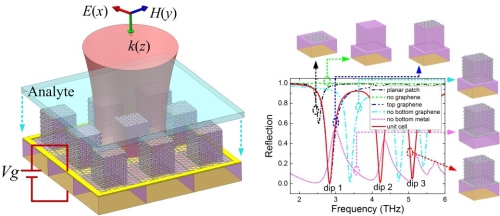On Mar. 19, 2018, the international famous SC-I journal Carbon (IF: 6.337) published the latest research achievement on terahertz metamaterials functional devices made by research group led by a research fellow from State Key Laboratory of Transient Optics and Photonics of XIOPM. The article is published online and titled “Multiple plasmonic resonance excitations on graphene metamaterials for ultrasensitive terahertz sensing” with its first author PhD Chen Xu.
In the paper, a three-dimensional terahertz metamaterial structure constructed from grapheme is proposed and investigated. Multiple plasma resonance modes can be excited by interacting with terahertz waves. This paper proposes for the first time to apply the three-dimensional metamaterials structure with multiple plasma resonance modes to terahertz sensing, which has high sensing sensitivity and can realize multi-band terahertz ultra-sensitive active sensing and multi-band perfect absorption function, and provides an innovative method for terahertz sensing study.
Terahertz wave mainly refers to electromagnetic wave with a frequency of 0.1THz~10THz, which lies between infrared wave and microwave wave, and in the transition region between macroelectronics and microphotonics. It has many unique characteristics, such as low photon energy, strong penetration, molecular vibration and rotational energy levels covering organic molecules and biological macromolecules, etc. It is helpful to develop new spectral analysis and nondestructive testing technology and realize material characteristics testing, microelectronic testing, medical diagnosis, environmental monitoring, chemical and biological identification, and other important applications.
However, it is difficult for conventional materials in nature to produce effective electromagnetic response in terahertz band, and many difficulties have been encountered in the development of terahertz functional devices and the effective control of terahertz waves, which limits the development of terahertz technology and application and new innovative ideas are needed to deal with the shortage of natural materials in terahertz frequency band.
By artificially designing microstructure arrays with cell size at sub-wavelength magnitude, artificial electromagnetic metamaterials can achieve peculiar physical properties (such as negative refraction index, superlens and perfect absorption) that natural materials do not possess. It makes up for the shortage of electromagnetic materials in the terahertz band, can effectively control the amplitude, phase, polarization and transmission characteristics of terahertz waves, and provides an effective way to realize the functional devices in the terahertz band. It is expected to break through bottleneck of terahertz technology fundamentally. As a kind of two-dimensional planar material arranged in a single layer of carbon atoms, graphene has excellent performance in terms of light, electricity, force, heat, etc. Its conductivity in the terahertz band can be dynamically adjusted by applying a bias voltage, so the research and development of active terahertz functional devices is promising.

Download: